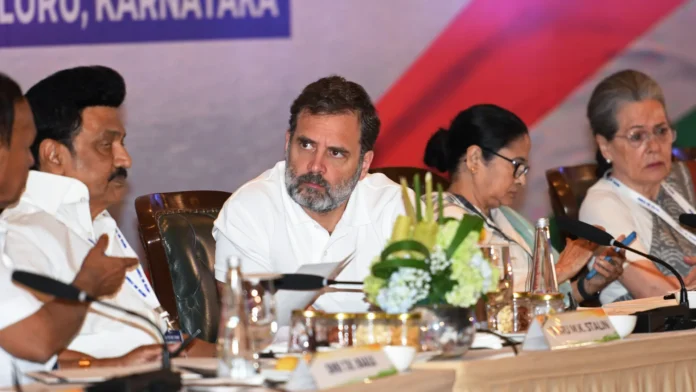AAP, founded on the principles of anti-corruption and grassroots activism, emerged as a formidable force in Indian politics, particularly in the national capital region of Delhi

Manoj Kumar Pathak
In the ever-evolving landscape of Indian politics, the dynamics of political alliances play a crucial role in shaping electoral outcomes, policy decisions, and the overall trajectory of governance. One such alliance that has garnered significant attention in recent times is the partnership between the Aam Aadmi Party (AAP) and the Indian National Congress. This article aims to delve deeper into the complexities of this alliance, examining its origins, implications, and broader ramifications within the context of Indian politics.
To fully grasp the nuances of the AAP-Congress alliance, it is essential to contextualize it within the broader framework of Indian politics. India’s political landscape is characterized by a multitude of parties representing diverse ideologies, regional interests, and social demographics. In such a scenario, alliances and coalitions often emerge as strategic imperatives for parties seeking to maximize their electoral prospects and influence.
The AAP, founded on the principles of anti-corruption and grassroots activism, emerged as a formidable force in Indian politics, particularly in the national capital region of Delhi. Led by Arvind Kejriwal, the party’s meteoric rise to power in Delhi sent shockwaves through the political establishment, challenging the traditional dominance of established parties like the Congress and the Bharatiya Janata Party (BJP). However, despite its initial success, the AAP faced challenges in expanding its footprint beyond Delhi, prompting it to explore alliances with other parties to strengthen its electoral prospects.
On the other hand, the Congress, one of India’s oldest political parties, has been grappling with a decline in its electoral fortunes in recent years. Facing electoral setbacks and internal challenges, the party has been exploring various strategies to revive its fortunes and regain relevance in Indian politics. The alliance with the AAP represents one such strategy aimed at consolidating opposition forces and presenting a united front against the ruling BJP.
The origins of the AAP-Congress alliance can be traced back to the political landscape of Delhi, where both parties have a significant presence and electoral stakes. In the run-up to the Delhi Assembly elections, discussions between the AAP and Congress leadership began regarding the possibility of an alliance to prevent vote-splitting and maximize the chances of defeating the BJP.
While initial talks between the two parties faced hurdles and roadblocks, primarily due to differences over seat-sharing and leadership dynamics, the imperative of defeating the BJP eventually outweighed internal disagreements. As a result, the AAP and Congress announced a strategic alliance for the Delhi Assembly elections, with the Congress agreeing to support the AAP in select constituencies.
The announcement of the alliance marked a significant moment in Indian politics, as it brought together two parties with distinct ideological moorings and political trajectories. While the AAP represented a new-age political movement rooted in anti-establishment activism and populist governance, the Congress embodied the legacy of India’s independence struggle and the Nehruvian vision of secularism and social justice.
The AAP-Congress alliance carries profound implications for the political landscape of Delhi and beyond. On one hand, it represents a pragmatic political calculus aimed at maximizing electoral gains and preventing the fragmentation of opposition votes. By presenting a united front against the BJP, the alliance seeks to capitalize on anti-incumbency sentiment and tap into the growing disenchantment with the ruling dispensation.
However, the alliance also raises questions about the ideological coherence and long-term viability of such partnerships. While the AAP and Congress may share a common goal of defeating the BJP in the short term, their ideological differences and divergent political trajectories could pose challenges in sustaining the alliance beyond electoral considerations.
Moreover, the AAP-Congress alliance has sparked debates and discussions within political circles and among the electorate regarding the credibility and integrity of both parties. For the AAP, which rose to power on the promise of clean and transparent governance, the alliance with the Congress, a party often associated with corruption and dynastic politics, has raised eyebrows and invited criticism.
Similarly, for the Congress, which has been struggling to regain its electoral relevance and connect with the masses, the alliance with the AAP represents a calculated gamble aimed at consolidating opposition forces and preventing further electoral setbacks. However, the party’s decision to align with a relatively new political entity like the AAP has drawn scrutiny and skepticism from various quarters.
The AAP-Congress alliance faces a myriad of challenges and opportunities as it navigates the complex terrain of Indian politics. On one hand, the alliance provides both parties with a platform to showcase their strength and relevance in the political landscape, particularly in Delhi and other urban centers where they have a significant presence.
Moreover, the alliance offers an opportunity for the AAP and Congress to leverage each other’s strengths and resources to mount a formidable challenge to the BJP in the upcoming elections. By pooling their organizational machinery, grassroots support base, and electoral strategies, the alliance partners can create a synergy that enhances their electoral prospects and expands their political footprint.
However, the alliance also faces inherent challenges, including ideological differences, leadership dynamics, and organizational coherence. The AAP and Congress come from distinct political backgrounds and represent divergent ideologies, making it challenging to reconcile their differences and forge a cohesive narrative that resonates with voters.
Moreover, the alliance partners must navigate the complexities of coalition politics, balancing competing interests and managing intra-party dynamics to ensure the smooth functioning of the alliance. This requires effective communication, coordination, and collaboration between the leadership of both parties, as well as a shared commitment to the principles of transparency and accountability.
In addition, the alliance partners must contend with the electoral arithmetic and political calculus of Delhi, where the BJP remains a formidable force despite facing anti-incumbency challenges. To emerge victorious in the upcoming elections, the AAP-Congress alliance must not only consolidate their respective support bases but also appeal to swing voters and undecided constituents through a compelling narrative and a robust policy agenda.
The AAP-Congress alliance represents a significant development in Indian politics, with far-reaching implications for the electoral landscape of Delhi and beyond. While the alliance offers both parties an opportunity to consolidate opposition forces and present a united front against the BJP, it also poses challenges in terms of ideological coherence, leadership dynamics, and organizational cohesion.
As the alliance partners navigate the complexities of coalition politics and electoral arithmetic, they must remain mindful of the broader implications of their partnership and prioritize the interests of the electorate above narrow political considerations. Ultimately, the success of the AAP-Congress alliance will depend on its ability to harness the collective strength and resources of both parties to deliver on the promises of governance, accountability, and inclusive development.


